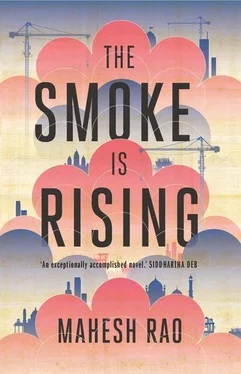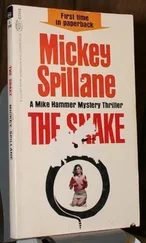Mala had little knowledge of Gayathri’s home life, having only got so far as to ascertain that she had no children. Gayathri’s response to a query from Girish about her husband was: ‘ Aiya , he comes and he goes.’
With that she had let out her long, throaty laugh, a perplexing noise that sounded like a series of quick hiccups, each being ambushed by the next.
There was no evidence of scabrous entertainments in Gayathri’s life but there existed an air of gratification and an earthy zeal about her that Mala had not encountered before. She had once asked Girish if he thought Gayathri drank. He had immediately responded with an interrogation as to whether Mala had smelt alcohol on her breath, had she been acting strangely, was there something wrong with her work, had someone said anything? Well, why was she asking then?
Mala regretted ever having brought it up.

The letter was addressed to the Head of Customer Services at the regional electricity distribution company and ran to three pages of block text. The author, the Chief Executive Officer and majority shareholder of a small company based in the industrial corridor to the south of Mysore, was by turns deeply concerned, immensely frustrated and utterly scandalised. The power situation in Karnataka had reached such a nadir that, by hook or by crook, urgent measures were required, come what may, without which, rest assured, there would be extremely adverse consequences for the future of Mysore as an attractive investment area. Furthermore, this was nothing less than a clarion call for the state’s reputation as a centre for the enhancement of development opportunities.
The letter’s author recognised that the damage to the country’s reputation as a rising superpower did not require elaboration but, nevertheless, felt compelled to enumerate all the associated dangers. The author also pointed out that there was neither rhyme nor reason, prudence nor perception, aim nor ambition in the state’s power-supply policies. He graciously acknowledged the lack of long-term investment in the sector and the grave challenges posed by transmission leakages and power theft; even so, his only option was to highlight to the authorities the fact that there was simply no justification for the current dismal state of affairs.
Attached to the letter was a schedule detailing the dates and times of load-shedding, power holidays and voltage drops in the last six months, along with calculations of output decline, loss of revenue, and expenditure on alternate power supplies. The author sought a full and frank explanation for the unscheduled power losses and a complete and comprehensive plan for the avoidance of such eventualities in the future. If an adequate response was not forthcoming, each and every legitimate avenue would be explored by the author of the letter, including, but not limited to, judicial intervention. The author’s final point was that the idea of a project such as HeritageLand being contemplated in Mysore would be comical were it not so insulting. The letter was copied to the Karnataka Electricity Regulatory Commission, the Mysore Enterprise Forum, the Mayor’s office and the Federation of Indian Chambers of Commerce and Industry.
Girish slowly replaced the letter in a manila folder marked ‘Urgent’ with a faded red marker pen. The word was followed by a hurried slash, an exclamation mark that added a comedic exigency to the whole business: bungling officials skidding on banana skins and walking into doors as they scurried around, attempting to resolve the power crisis. He wished he could see the funny side, but there was not much laughter to be had on the second floor of Jyothi House at a quarter to three in the afternoon. A pile of quality assurance statements and various drafts of the customer grievance handling procedure sat on the corner of his desk. He flicked the folder on top of this pile, its edges crinkled with heat and sweat, the constituent layers accordioning out in a last mad dash.
A few minutes later Girish called the Director of Customer Relations again but was met by the same collapsed voice telling him in three languages that the mobile phone he was trying to call was either switched off or out of range. He tried the Director’s secretary once more. Sarita answered on the second ring and stated again that sir was in a meeting but yes sir, she had already passed on the message sir, when sir had emerged for a break, and sir had said that he would call sir as soon as possible, but you know how these meetings are sir, especially the meetings with sir, so she really could not specifically inform sir as to when exactly sir would be free to speak to sir but, of course sir, without a doubt sir, she would make sure that she reminded sir when he next emerged, not to worry sir, thank you sir, good afternoon sir. Girish knew she was lying; he could picture her face, like a boulder wearing a bindi . He also knew he would call her again in half an hour and hated himself for it.

Susheela’s left ear was beginning to smart so she transferred the receiver to her other side.
‘We’re having the downstairs bathroom redone. It’s been such a torture, I can’t tell you, and now that the workmen are finally in, life is even worse. Yesterday when I came back they had left the front door wide open and were nowhere to be seen. Now the stupid company has sent the wrong shower door and I’m going to have to sort all of that out,’ said Priyanka, Susheela’s elder daughter.
‘I know, everything goes wrong at the same time,’ said Susheela.
‘Exactly. And Vivek’s in Brussels again, so that’s really helping. Actually he called last night but the line was so bad. It’s been happening the last few times. I think they’ve sold him the same dabba mobile that they sold me, remember? And of course, he’ll make me go and sort all of that out because he’ll claim to be too busy. Amma ? One sec, one sec, okay … just got to get this.’
Susheela’s mouth felt dry and chalky as she listened to Priyanka’s travails. She swallowed hard, having completely lost the thread of the conversation some minutes ago. This in itself was not unusual. Their fortnightly conversations had come to mean progressively less to Susheela. Of course, it was lovely to hear from Priyanka and there was still that warm ripple when she remembered things Susheela had mentioned the previous fortnight. But their worlds had caromed apart a few years ago and the ties had grown flaccid and indistinct. Priyanka’s chatter now seemed like the background buzz from television or titbits gleaned from mobile phone conversations in the doctor’s waiting room. There were vague allusions to Katherine and Carlos, Jude and Alice, Matt and Chris. The call would be interrupted at times by mumbled asides to her PA or her husband. Susheela had noticed that of late Priyanka seemed to have a stock set of questions that she would clatter through, often hurriedly ending the conversation, promising further detail by email. These emails would arrive a few days later, stippled with exclamation marks and breezy references to Merzbau installations, shochu bars, experimental dance and city breaks to Stockholm and Berlin.
Susheela had not consciously withdrawn from Priyanka’s elaborate life. She would not even have recognised the growing distance as a consequence of her own actions. Her retreat was subliminally pre-emptive: she had begun an instinctive process of shutting out before she was cast as the lonely interfering mother gazing at her daughter sashaying into the distance. As far as Susheela was concerned, the important thing was that the precepts of form and propriety were maintained. So calls were made, emails read, cards sent. To proceed otherwise would be to descend into sloth and chaos.
Читать дальше













